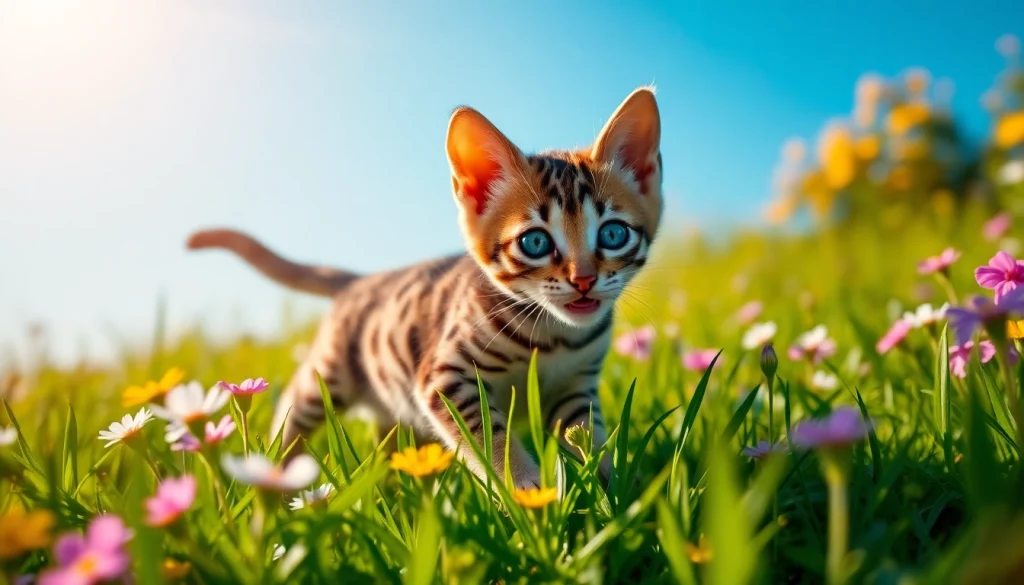Understanding the Characteristics of Bengal Kittens
1. Unique Physical Traits
Bengal kittens are renowned for their striking appearance that embodies the wild elegance of their leopard ancestors. Their coats are a spectacle of beauty, marked by a variety of patterns that often include rosettes, spots, and marbled designs. The rich colors range from the classic golden brown to intense silver and snow varieties, each bringing a unique flair to their overall look.
One of the most recognizable features of the Bengal is its soft, plush coat that has a luxurious feel. Unlike typical short-haired cats, Bengal kittens have a unique pelt-like texture due to their fine guard hairs. Their large, oval eyes can vary in color from deep green to blue, immediately drawing attention to their expressive face that is both intelligent and playful.
2. Personality Traits of Bengals
Bengal kittens are not only eye-catching; they are also characterized by their vibrant personalities. Infused with energy, these kittens are playful and curious, often described as having a dog-like enthusiasm. They have a great need for stimulation, requiring a well-structured playtime and plenty of interactive toys to keep their mind engaged.
Bengals are highly social creatures and thrive on interaction with both human companions and other pets. They form strong bonds with their families and often exhibit loyalty and affection. The intelligence of a Bengal means that they are quick learners, making them relatively easy to train for tricks and commands. Their playful demeanor can sometimes lead to mischievous behavior, so it is essential to provide them with appropriate outlets for their exuberance.
3. Health Considerations for Bengal Kittens
As with any breed, health considerations for Bengal kittens are paramount. Bengals are generally healthy, but like all cats, they can be prone to certain genetic conditions. Common health issues include hypertrophic cardiomyopathy (HCM), which is a heart condition, and certain eye conditions.
Future Bengal owners should ensure they acquire their kittens from reputable breeders who perform health screenings on the breeding stock. Additionally, regular veterinary check-ups, vaccinations, and a proper nutrition plan are crucial for maintaining the health and well-being of your Bengal kitten. Keeping them active and engaged will also play a significant role in preventing obesity, which can lead to further health issues.
Where to Find Bengal Kittens for Sale
1. Reputable Breeders vs. Pet Stores
When searching for Bengal Kittens for Sale, one of the most critical decisions is choosing between reputable breeders and pet stores. While pet stores may have a variety of cat breeds available, the quality of care and health guarantees are often questionable. Many kittens sold in pet stores come from large-scale breeding facilities that prioritize profit over the well-being of the animals.
Conversely, reputable breeders take pride in producing healthy, well-socialized Bengal kittens. These breeders invest time in the early socialization of their kittens and typically conduct health screenings. Responsible breeders are also open to questions regarding their breeding practices and the health of their kittens, providing prospective owners with valuable insights about their future pets.
2. Online Resources and Guidelines
There are numerous online platforms that connect buyers with breeders of Bengal kittens. Websites like the International Bengal Cat Society (IBCS) offer resources for finding trusted breeders and understanding the nuances of Bengal ownership. Moreover, social media platforms and online forums can also provide recommendations and personal experiences that can guide potential owners in their search.
It’s essential to conduct thorough research when engaging with online listings. Always check the breeder’s reputation, look for reviews or testimonials, and ask for health records for your potential new kitten. Additionally, conversations with the breeder will help ensure you are aligned with their values and practices concerning animal welfare.
3. Local Shelters and Adoption Opportunities
While Bengal kittens are often sought after from breeders, adopting from local shelters or rescue organizations should not be overlooked. Many shelters have cats of all breeds, including Bengals or Bengal mixes, looking for loving homes. Adoption can be a fulfilling route to take and often comes with the added benefit of a reduced adoption fee, which typically includes vaccinations and spay/neuter services.
When considering adoption, it’s essential to visit the shelter in person to interact with the kittens and assess their personalities. Speak with shelter staff for insights on the kittens’ histories and behaviors, which can help determine the best fit for your lifestyle.
Preparing Your Home for a Bengal Kitten
1. Essential Supplies and Accessories
Before bringing a Bengal kitten home, it’s crucial to prepare your living space with the right supplies. Essential items for newcomers include a high-quality litter box, clumping litter, food dishes, a scratching post, and engaging toys. Bengals thrive on interaction, so investing in puzzles and interactive toys will keep them mentally stimulated.
For feeding, choose high-quality, protein-rich kitten food designed to support their growth. A good diet will help ensure they develop healthily. Moreover, setting up a designated sleeping area with a cozy bed will help your kitten feel secure in their new environment.
2. Cat-Proofing Your Living Space
Cat-proofing your home is an important step before introducing a Bengal kitten into your environment. Cats are naturally curious and will explore their surroundings. Ensure that toxic plants, chemicals, and small objects that could pose choking hazards are stored away safely. Secure any cords or strings that could lead to accidents, and ensure windows are secure to prevent escapes.
Additionally, consider creating a safe space within your home with access to their essential items, such as food, water, litter box, and scratching post, all arranged for easy access. Designate this area as “kitten central” where they can adapt and grow comfortable without overwhelming exposure to the rest of the house immediately.
3. Creating a Safe and Fun Environment
To foster a stimulating and secure environment for your Bengal kitten, consider adding climbing trees, tunnels, and shelves. Bengals enjoy vertical space, so providing them with opportunities to climb and explore will keep them physically active. Moreover, engaging with them through interactive play fosters bonding and provides necessary exercise to help curb behavioral issues.
Setting aside time for daily play, alongside providing interactive toys, will also help reduce boredom. If you’re at work, consider leaving safe toys, or puzzle feeders, to keep them entertained in your absence.
The Cost of Bengal Kittens for Sale
1. Factors Influencing Price
The price of Bengal kittens can vary significantly based on several factors, including the breeder’s reputation, the kitten’s lineage, and regional pricing trends. Typically, Bengal kittens can range from $1,000 to over $3,000. Early-generation Bengals, especially those that closely resemble their wild ancestors, tend to be more expensive.
Additional factors influencing price may include the kitten’s age, coat pattern, and whether the kitten comes with a health guarantee or has been spayed/neutered prior to sale. Kittens raised in well-established catteries with regimen breeding practices will typically cost more than those from less reputable sources.
2. Budgeting for Care and Supplies
In addition to the initial cost of purchasing a Bengal kitten, prospective owners should budget for ongoing care and supplies. Essential startup costs can include veterinary exams, vaccinations, spaying/neutering, food, litter, toys, and scratching posts. Overall, first-year costs can range from $2,000 to $3,000, while ongoing care is typically around $500 to $1,000 annually.
Planning for unexpected expenses, such as emergency veterinary care or behavioral training, is also wise. Having a savings fund set up can help cushion any financial surprises that arise as your kitten grows.
3. Financing Options for New Pet Owners
For potential kitten owners who may not have the upfront cash to buy a Bengal kitten, there are financing options available. Many veterinarians and animal hospitals offer financing plans for pet care, which can be a resource for those who need assistance managing initial expenses.
Additionally, various organizations specialize in loans for pet purchases that can help cover initial costs, giving new pet parents the convenience of lower monthly payments. Always ensure you read the fine print on any financial agreements to understand interest rates and repayment times before proceeding.
Caring for Your Bengal Kitten
1. Nutrition and Feeding Tips
Nourishing your Bengal kitten with a balanced diet is crucial for their growth and energy levels. High-quality, protein-rich kitten food should be prioritized, as Bengal kittens require extra calories compared to adult cats due to their active lifestyle. Opt for foods that list meat as the first ingredient, and be cautious of brands with excessive fillers or artificial additives.
Additionally, it is important to provide fresh water daily and monitor their eating habits. Maintaining a consistent feeding schedule can help prevent obesity and establish a routine that keeps your kitten’s energy levels stable throughout the day.
2. Training and Socialization
Training your Bengal kitten should begin as early as possible. Using positive reinforcement techniques, such as treats and praise, can help build an effective training routine. Basic commands, litter box training, and introduction to scratching posts can set your kitten up for a harmonious life in your home.
Socialization is equally important. Introducing your Bengal kitten to various people, pets, and environments early on can foster a well-adjusted adult cat. Engage in playdates with other friendly pets and introduce novel experiences gradually to prevent overwhelming your kitten.
3. Regular Veterinary Care and Wellness
Routine veterinary care is essential for maintaining your Bengal kitten’s health. Schedule regular check-ups, vaccinations, and preventive treatments for parasites. Bengals are prone to certain genetic disorders, so maintaining a good relationship with your veterinarian can help monitor any potential issues as your kitten matures.
Moreover, dental care is an often-overlooked area that contributes to your kitten’s overall health. Regular brushing and offering dental treats can help prevent dental issues from developing.


